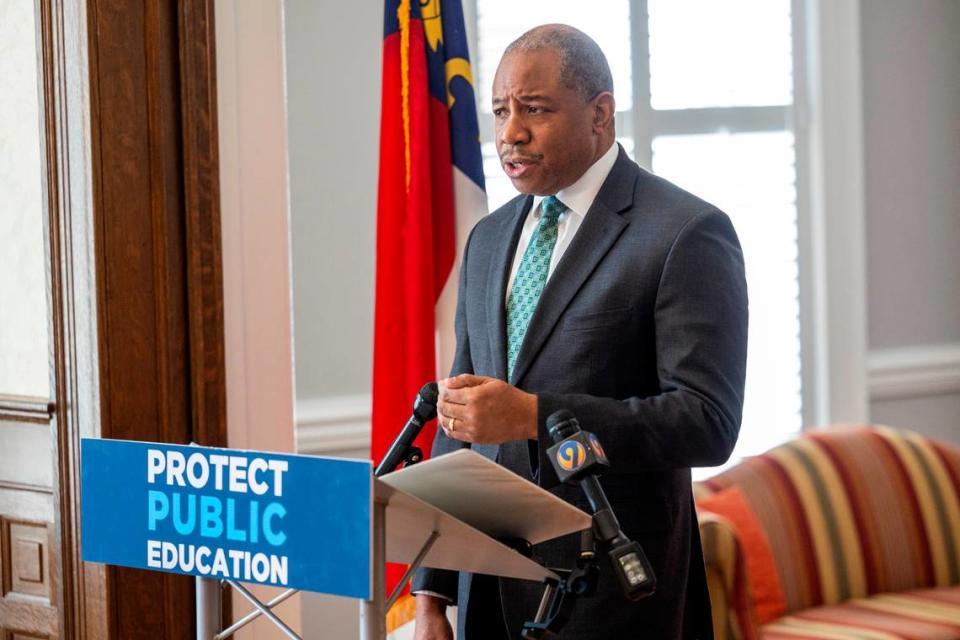NC superintendent candidate decries GOP opponent’s ‘violent rhetoric.’ How she responds
- Oops!Something went wrong.Please try again later.
- Oops!Something went wrong.Please try again later.
- Oops!Something went wrong.Please try again later.
The two candidates running to lead North Carolina’s public schools are accusing each other of promoting radical agendas that would devastate public education in the state.
Mo Green, the Democratic nominee for state superintendent, charged Thursday that GOP nominee Michele Morrow is anti-public schools and engages in violent rhetoric. Green focused on social media posts where Morrow talked about executing prominent Democrats and called public schools “socialist indoctrination centers.”
But in a new campaign video this week, Morrow called Green a “radical extremist.” She’s focused on the grants that the Z. Smith Reynolds Foundation gave when Green was the progressive group’s executive director from 2016 to 2023.
The campaign rhetoric will only heat up as Green, the former superintendent of Guilford County Schools, takes on Morrow, a registered nurse and homeschool parent.

Green: Don’t tolerate Morrow’s ‘violent rhetoric’
Morrow, a Donald Trump supporter who protested outside the U.S. Capitol on Jan. 6, 2021, upset incumbent Republican Superintendent Catherine Truitt in the March 5 GOP primary.
Morrow has received national attention over the past week since CNN reported on her past social media posts, including those that talked about killing President Joe Biden, former President Barack Obama, North Carolina Gov. Roy Cooper and other Democrats.
“I prefer a Pay Per View of him in front of the firing squad,” Morrow wrote in a tweet from May 2020, responding to a user sharing a conspiracy theory who suggested sending Obama to prison at Guantanamo Bay. “I do not want to waste another dime on supporting his life. We could make some money back from televising his death.”
CNN also reported how Morrow used the #DeathtoTraitors hashtag at least 12 times on social media, including on a 2020 post on the social network Parler talking about Cooper and COVID-19 restrictions.
In posts from 2010 to 2021, Morrow made anti-Islamic comments, used QAnon slogans and talked about the conspiracy theory that thousands of Chinese troops were massed on the Canadian border “waiting for orders to invade,” CNN reported.
“My opponent has a much darker view,” Green said Thursday during a news conference at the North Carolina Democratic Party’s headquarters in Raleigh. “It is one that is fueled by dangerous conspiracies and calls for violence, including the executions of President Barack Obama, Gov. Roy Cooper and other elected officials.”
Green added that “we cannot allow this type of violent rhetoric into our schools through the top public education leadership position of our state.”

Morrow: Media playing ‘gotcha’ games
Morrow accused CNN of “stalking” her after reporters tried to interview her Tuesday about her social media posts outside the Wake County Republican Party Convention in Raleigh.
In a post Wednesday on X, formerly called Twitter, Morrow charged that CNN is “trying to interfere in the 2024 election” and that “CNN thinks they can choose who leads K-12 in NC by intimidating me and lying to you.”
“People are tired of the dysfunctional media trying to create ‘gotcha moments’ out of old comments taken out of context, made in jest, or never made in the first place,” Morrow previously told The News & Observer in response to the CNN report. “I’ve pointed out that North Carolina has 800 failing schools and no plan for fixing them.
“I’m talking about the millions of dollars misappropriated and squandered that should be put into classrooms. These issues matter more to voters than overdramatized gotcha moments ginned up by the media.”
Morrow calls Green a ‘radical extremist’
Morrow has responded to criticisms of her social media by accusing Green of being an extremist.
“I am facing the most radical extremist the Democrats have ever run for superintendent in the history of North Carolina,” Morrow said in her new campaign video. “My opponent spent six years leading a progressive organization that funded efforts to destroy families, public schools and everyone’s safety in the state.”
The Z. Smith Reynolds Foundation is a Winston-Salem-based foundation that invests in public education and other civic issues. The group talks on its website about its commitment to using a racial equity lens and promoting diversity and inclusion around the state.
Morrow accuses Green of funding groups that are trying to remove police officers from schools, groups that rioted during the 2020 George Floyd protests and groups that are “responsible for bringing thousands of illegal aliens into our state.”
“If elected, he will continue to push the extreme agendas that are currently threatening our students’ safety and their future,” Morrow said.
Green: Foundation’s work is ‘far from radical’
Green responded Thursday to Morrow’s charges by focusing on the Z. Smith Reynolds Foundation’s work on education issues, particularly the long-running Leandro school funding case that’s back before the N.C. Supreme Court.
The foundation helped fund the school districts suing the the state for more money. The foundation also helped pay for the consultant who developed the plan that calls for spending at least $5.6 billion over eight years to try to provide every student with a sound basic education.
“Z. Smith Reynolds has done some remarkable work on behalf of all North Carolinians, particularly those who are marginalized by our society,” Green said.
In an interview after the news conference, Green said that the foundation’s work to increase public school funding is “far from radical and actually what’s needed in our state.”
“There are going to be some folks who are going to say when you try to support marginalized communities and bring them to the forefront and say they should have a place at the table that that’s considered radical,” Green said. “I would suggest to you that is what we should be doing for all North Carolinians.”

